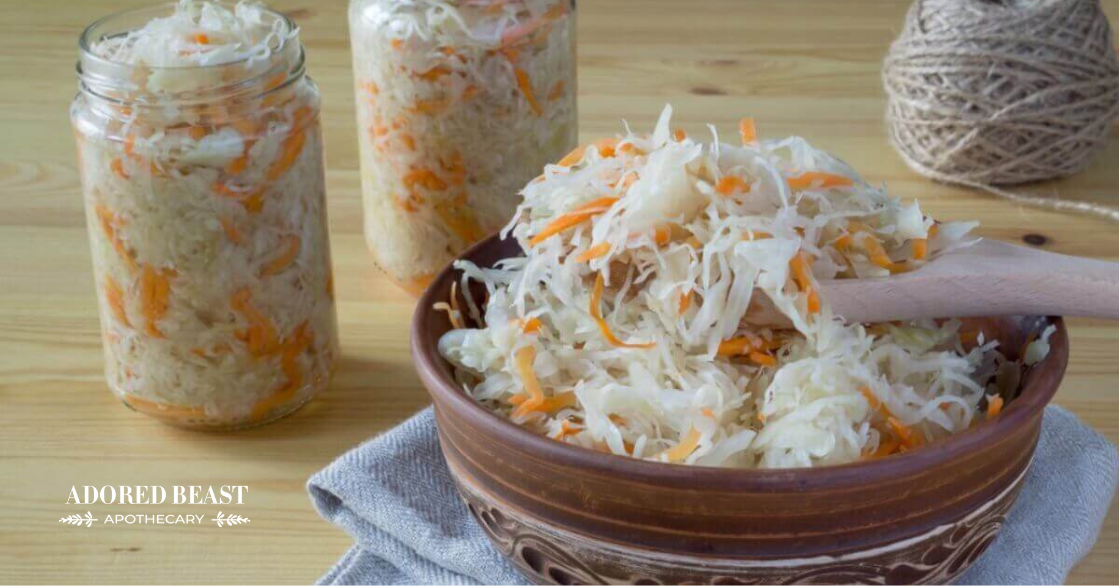Many dog parents add veggies to their animals’ diets. Vegetables provide a vast array of vitamins, minerals, antioxidants, and polyphenols that are critical for health and longevity. Just as we all need our 5-10 a day, our dogs can benefit from some green in the food bowl too.
The thing is, raw veggies can be tough for our pups to digest properly, so we have to help them. This means preparing them in a way that breaks down a vegetable’s cellular walls, making the nutrients more bioavailable. The natural way for dogs and wolves to eat vegetables is through the gut of their prey, which has already been pre-digested.
And one way that you can do this is through fermentation. This method not only breaks those veggies down, it also provides a ton more healthy benefits.
So how do we make fermented vegetables for dogs?
Why We Love Fermented Vegetables for Dogs
As mentioned, fermented foods are easier to digest than raw or cooked vegetables, and the gut doesn’t have to work as hard to break them down and absorb the nutrients from them.
But they also provide two other very important things:
- Probiotics – we’re always keeping an eye on gut health, and probiotics play a big role in keeping the gut healthy. Fermented foods provide healthy, natural probiotics for gut health – the good bacteria grows during the fermentation process. Probiotics are the friendly bacteria that thrive in the gut, protecting against harmful bacteria overgrowth, and thus helping overall health.
- Digestive Enzymes – digestive enzymes are compounds that aid digestion. They assist in the digestive process, breaking down food and allowing your pet to gain nutrition from their food. Most animals make their own digestive enzymes, but that doesn’t mean they’re getting enough – especially if they have a digestive issue. Many fermented foods contain healthy digestive enzymes to help with your animal’s digestion.
Perfect, fermented vegetables for dogs are a go!
Next up – how to make them.
How to make Fermented Vegetables for Dogs
Fermented vegetables for dogs are pretty simple to make, but they do take some time to ferment. That said, these babies are worth the wait!
This is the recipe we use at home – it was shared by our friends Larry and Charlie at PAWDEGA – and it’s an easy one for beginners!
Here’s what you need:
- 500ml celery juice (you can make this in a juicer!)
- 1/4 teaspoon probiotics (we use Love Bugs)
- Shredded vegetables: lots! Carrots, celery greens, cabbage, broccoli, beets – those are our favourites to use. You can chop them up fine or use a food processor. (For dogs with yeast, carrots are high in sugar, so skip those).
- A few cabbage leaves – you’ll need one for the top of each mason jar
- Mason jars
To make your veggies:
- Blend your started culture by mixing the celery juice and the probiotics
- In a deep pan or big bowl, mix the starter culture in with the veggies
- Fill the jars – pressing down as you fill. You really want to pack the veggies in tight, but don’t fill it right to the top
- Fit a cabbage leaf down on top of the veggies to hold them in place
- Close the jar, slightly, not tight
- Place the jar in a room temperature area for 7 days
You can feed 1 to 3 teaspoons of fermented vegetables a day for every 20 pounds of body weight, starting out slow if this is a new food for them. If your dog is picky, mix them in well with their other food, rather than just on top.
Here’s Charlie making them for their own dog!
Can You Buy Fermented Veggies?
Of course!
We like to make ours because we can choose exactly which vegetables and know exactly what’s in the jar. We also like to added benefit of the additional probiotics.
But of course if you don’t have the time, or prefer to purchase fermented vegetables for your animal, that’s great too! Many natural health food stores sell them for humans, and some pet stores will even have them for pets!
If you’re buying one made for humans, these are 2 things to watch out for:
- Low sodium. Many pre-made fermented vegetables have high sodium counts, so make sure you’re watching the levels.
- Onions. Many fermented vegetables made for humans contain onions, so watch for that on the ingredient list.
Fermented vegetables for dogs are an easy way to add a whole host of beneficial properties to your pet’s dinner – make some today and enjoy!












